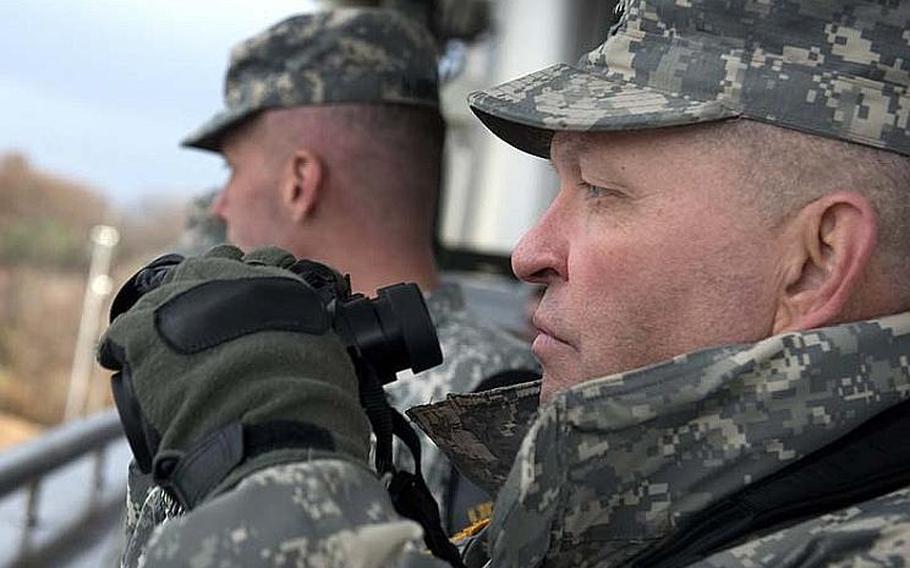
U.S. Army Gen. James Thurman, U.S. Forces Korea commander, looks towards North Korea during a visit to the Demilitarized Zone in South Korea on Nov. 11, 2012. Thurman told a town hall meeting on Jan. 23 that U.S. forces are in a period of "high vulnerability" following Pyongyang's test of a long-range rocket in December. (D. Myles Cullen/U.S. Army)
SEOUL — As threatened, North Korea stopped answering a two-way hotline in the Demilitarized Zone on Monday, symbolically marking its decision to no longer recognize the armistice that ended the Korean War almost 60 years ago.
However, South Korea’s Ministry of Unification said the North still is using a separate military communication line to process the 1,000 South Koreans who commute regularly across the DMZ to the Kaesong Industrial Complex, where they work with 40,000 North Koreans despite a recent flurry of threats from both countries to wipe each other off the map.
Technically, officials say, one country cannot unilaterally void the armistice that has, with mixed results, governed the fragile peace on the peninsula since it was signed July 27, 1953.
U.S. Forces Korea downplayed the DMZ hotline going dead.
In response to the North’s threats to that effect last week, USFK spokeswoman Jennifer Buschick said, “Reports of [North Korea] cutting off communications are not unusual, and are frequently experienced during exercise periods.
“When we place a call on the direct phone line and [North Korea] does not answer, we have no way of knowing if [the North] has actually disconnected the phone line or are just not answering the phone,” she said.
The latest round of threats from North Korea was prompted by the U.N. Security Council’s decision to slap additional sanctions on the rogue country for its third nuclear test on Feb. 12, and the U.S. and South Korean militaries’ largest annual joint exercises, involving thousands of troops. Monday was the start of Key Resolve, the second of the two overlapping exercises.
Despite allied assurances the exercises were defensive in nature, North Korean officials have labeled Foal Eagle and Key Resolve as provocative practices for an attack on the cloistered country, and violations of the armistice.
By no longer recognizing the pact, a pro-North website said, “This means that [North Korea] is no longer bound by the armistice or the [North-South] pacts and is free to strike back at the U.S. imperialists and South Korean puppets at any time.”
Despite the bluster, the North has on a number of occasions in recent years dismissed the armistice as a meaningless piece of paper. It has repeatedly shown little allegiance to the spirit of the pact.
In 2010, North Korea sank a South Korean warship and launched an artillery attack on an island just south of the maritime border between the two countries, leaving 50 people dead.
Stars and Stripes Yoo Kyong Chang contributed to this report.